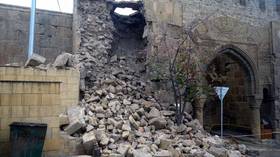UNESCO World Heritage site collapses due to heavy rain in Dagestan, local mayor points blame at Moscow

A UNESCO World Heritage site in Dagestan partially collapsed after heavy rain. Local authorities claim they’d warned Russia’s Culture Ministry about the condition of the Orta-Kapi gate in Derbent, the country’s second-oldest city.
That's according to the city's acting mayor Rustambek Pirmagomedov, who has pointed the finger at the federal government for neglecting Derbent's fortifications, in what he called a "big emergency for the city."
Derbent is the southern-most city in Russia, and over 1,500km south of Moscow.
Also on rt.com Landmark 19th century Christian cathedral in Nagorno-Karabakh damaged during shelling by Azerbaijani forces – Armenian military"For several years we have been sounding the alarm about its poor condition, and have appealed to all authorities with a demand to carry out reconstruction work," Pirmagomedov explained on Tuesday morning.
"According to the law, we cannot fix the wall on our own. This is the area of responsibility of the Ministry of Culture of Russia."
In Pirmagomedov's opinion, bureaucracy had led to an important part of the city's history being damaged.
According to news agency RIA Novosti, local residents noticed deep cracks in the fortress walls two months ago, but nothing was done.
The citadel, ancient city, and fortress buildings of Derbent were designated as heritage sites by UNESCO in 2003. According to the UN agency, Derbent has been continuously inhabited for 2,000 years. The city's protected fortifications were built in the 5th century by the Sasanian Empire, and over the centuries the city has been controlled by Persian, Arabic, Mongol, and Timurid governments. In the 19th century, Derbent became part of the Russian Empire, and soon after lost its defensive importance.
If you like this story, share it with a friend!














